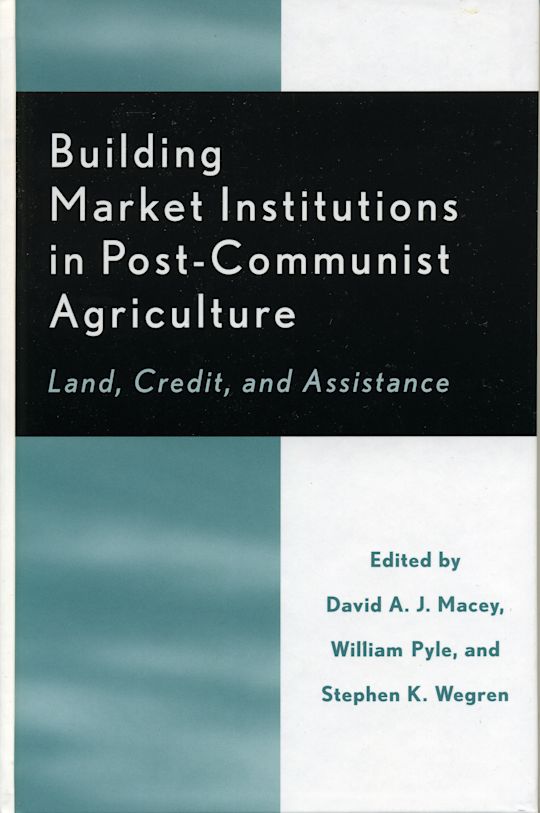- Home
- ACADEMIC
- Sociology
- Sociology - Other
- Building Market Institutions in Post-Communist Agriculture
Building Market Institutions in Post-Communist Agriculture
Land, Credit, and Assistance
David A. J. Macey (Anthology Editor) , William Pyle (Anthology Editor) , Stephen K. Wegren (Anthology Editor) , Dirk Bezemer (Contributor) , Peter Bloch (Contributor) , Daniel W. Bromley (Contributor) , Malcolm Childress (Contributor) , Nancy Cochrane (Contributor) , Liesbeth Dries (Contributor) , Craig Infanger (Contributor) , Zvi Lerman (Contributor) , David A.J. Macey (Contributor) , Stefan R. Osborne (Contributor) , Glenn D. Pederson (Contributor) , David Sedik (Contributor) , Johan F.M. Swinnen (Contributor)
Building Market Institutions in Post-Communist Agriculture
Land, Credit, and Assistance
David A. J. Macey (Anthology Editor) , William Pyle (Anthology Editor) , Stephen K. Wegren (Anthology Editor) , Dirk Bezemer (Contributor) , Peter Bloch (Contributor) , Daniel W. Bromley (Contributor) , Malcolm Childress (Contributor) , Nancy Cochrane (Contributor) , Liesbeth Dries (Contributor) , Craig Infanger (Contributor) , Zvi Lerman (Contributor) , David A.J. Macey (Contributor) , Stefan R. Osborne (Contributor) , Glenn D. Pederson (Contributor) , David Sedik (Contributor) , Johan F.M. Swinnen (Contributor)
For information on how we process your data, read our Privacy Policy
Thank you. We will email you when this book is available to order
You must sign in to add this item to your wishlist. Please sign in or create an account
Description
Eurasia emerged from the former Soviet states' failed agrarian program poised to be a great power in the new global economy. In the late 1980's, post-communist states put forth an agrarian reform plan that promised whirlwind institutional change as its goal. However, these amendments did not unleash the efficiency and productivity that privatization and "destatizing" seemed to promise. Editors David Macey, William Pyle, and Stephen Wegren, along with a host of world-leading agrarian analyst and practitioners, discuss the shortcoming of post-communist agrarian reform and reveal how and why particular policies were or were not adopted. Building Market Institutions in Post-Communist Agriculture draws on country-level case studies to analyze various initiatives undertaken by agricultural economies. Contributors use a comparative analytical framework to shed light on the complex universal processes of agrarian transformation that continue to change the social, economic, and political character of the former Soviet Union.
Table of Contents
Chapter 2 Part 1: Land Reform
Chapter 3 Introduction to Part I
Chapter 4 Land Privatization and Land Market Development: Two "Unsuccessful" Cases, Land Privatization and Land Market
Chapter 5 Russia's Indeterminate Land Privatization: Psychological Aspects
Chapter 6 Successful Land Individualization in Trans-Caucasia: Armenia, Azerbaijan, Georgia
Part 7 Part 2: Finance and Credit
Chapter 8 Introduction to Part II
Chapter 9 Missing Pillars: The Failures of Rural Finance In Ukraine
Chapter 10 Dual Credit Markets: The Indeterminate Case of Czech Agriculture
Chapter 11 Trade Credit and Successful Restructuring in The Polish Dairy Sector
Part 12 Part Three: Technical Assistance and Downstream Linkages
Chapter 13 Introduction to Part III
Chapter 14 Missing the Market: The Failure of Technical Assistance in Kyrgyzstan
Chapter 15 Technical Assistance to Armenian Agribusiness: Promising but Still Indeterminate
Chapter 16 Success in building Market Information Systems: Poland versus Russia
Chapter 17 Conclusion
Product details
| Published | 05 May 2004 |
|---|---|
| Format | Ebook (Epub & Mobi) |
| Edition | 1st |
| Extent | 256 |
| ISBN | 9780739152706 |
| Imprint | Lexington Books |
| Series | Rural Economies in Transition |
| Publisher | Bloomsbury Publishing |
About the contributors
Reviews
-
Agrarian economic and political policies represent the neglected stepchild of transition economics. Although it is not comprehensive, the contributors to this volume have illuminated the fundamental reasons for the disappointing outcomes of agrarian land reform, credit and finance policies and technical assistance in the post-Communist economies. Country specialists will find the analyses informed and compelling. Generalists will want it as a ready reference. The editors and other authors merit a resounding 'Bravo' for the performance.
James R. Millar, The George Washington University
-
This book provides a fascinating insight into land reform and the evolving financial and credit markets, as well as agricultural extension systems in selected post-communist countries. Combining theoretical and historical frameworks with recent developments, it is a significant addition to the knowledge base on transition economies.
Csaba Csaki, The World Bank



































